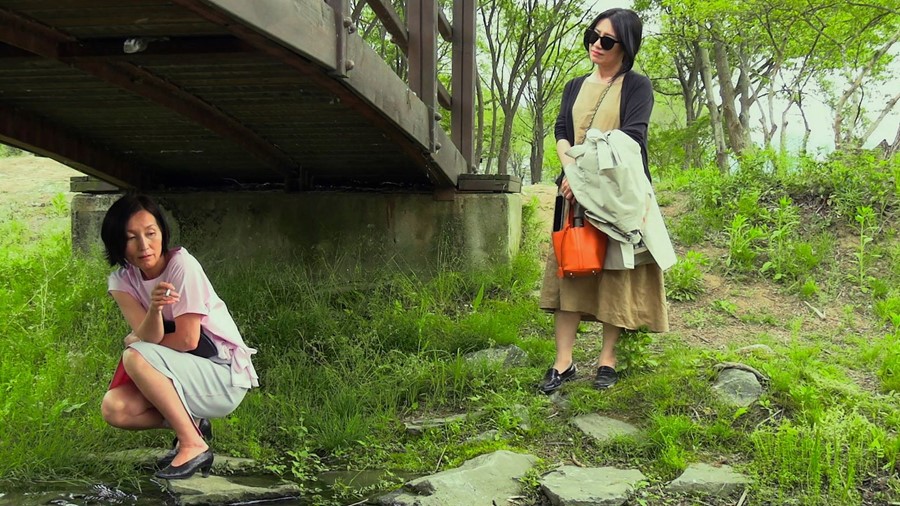As a new season launches at the ICA in London, here are five films by Cannes favourite Hong Sang-soo – many of which were made on a budget of less than $100,000
This article was originally published on 26 September 2022:
The globalisation of Korean pop culture has assured the place of countless Korean filmmakers in western public consciousness. In the mainstream, Academy Award winner Bong Joon-ho (Parasite) has few rivals besides his powerhouse contemporary Park Chan-wook (Oldboy) – whose latest film arrives in the UK via the BFI London Film Festival next month. In the arthouse world, Lee Chang-dong (Burning) is one of the most esteemed and highly-decorated, but when it comes to individualistic low-budget cinema, Hong Sang-soo is in a league of his own.
The auteur has made 28 features in 26 years. His films, often made without a script and on a budget of less than $100,000, have played at Cannes no less than eleven times – and since 2020, he’s picked up major awards at Berlin Film Festival on three consecutive years (including Best Director and the Grand Jury Prize). He works with some of the industry's greatest stars – including French Oscar nominee Isabelle Huppert (Elle) and Korean Oscar-winner Youn Yuh-jung (Minari). And his international fans include directors like Claire Denis (Beau Travail) and the great Martin Scorsese.
In 2004, the Goodfellas director praised Hong’s “masterful sense of storytelling” in films that “peel like an orange” to reveal layers of depth and meaning. Delicately filmed, Hong’s works are quiet and observational, utilising natural dialogue in broad, uncut scenes designed to reveal the nuances and intricacies of everyday human relationships. His characters are saturated with autobiographical elements (the modest lives of film directors and actors are a core focus) and booze – with soju-fuelled chats at cheap restaurants and cafes a mainstay. These are stories that concern life’s basic frustrations, encounters, ambiguities and possibilities – as emphasised by Hong’s frequent experimentations with structure and form.
The director’s latest work is exemplary of his unique brand of cinema – In Front of Your Face is released in UK cinemas from September 23 via New Wave Films. In anticipation, AnOther goes down the rabbit hole to explore some highlights of the director’s extensive and addictive filmography – find our picks below.
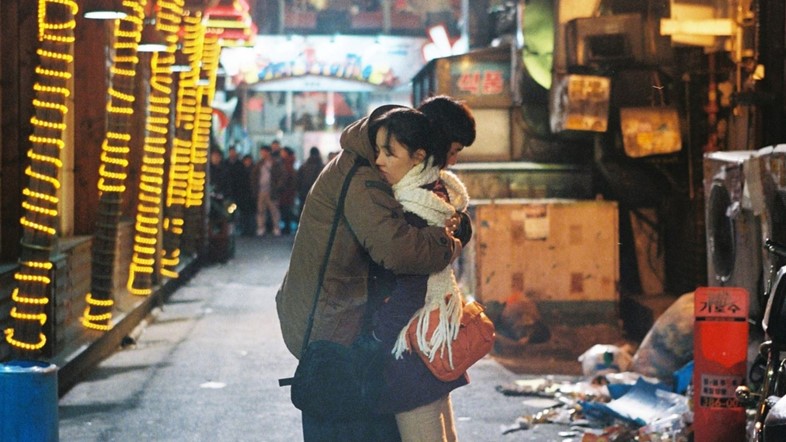
Tale of Cinema, 2005
Hong’s sixth film – his second to compete for the Palme d’Or at Cannes – is the ideal place to start. Tale of Cinema saw the director strengthen his position as auteur and introduce signature stylistic qualities, such as his trademark zoom shots, while also experimenting with structure and narrative. He does this so brilliantly here that the film is considered something of an indie masterpiece today.
Tale of Cinema follows a young man as he reunites with an old female acquaintance. The pair become lovers after a nighttime adventure through Seoul’s restaurants, bars, and karaoke parlours in the shadow of the iconic N Seoul Tower. Unexpectedly, the couple agree to a suicide pact, and attempt to go through with it. Then, everything changes. This narrative, it turns out, was part of a movie-within-a-movie, with theatre patron Kim (Kim Sang-kyung, Memories of Murder) then finding himself reliving similar events in real life as he pursues its lead actress, Choi (Uhm Ji-won), in the second half.
In August 2022, the film was explored by Dennis Lim as part of Fireflies Press’ masterful ten-part book series Decadent Editions – each of which explores a different milestone text in contemporary cinema. On the book’s reverse cover, Academy Award-winning director Ryûsuke Hamaguchi (Drive My Car) describes Hong’s sixth film aptly: “Here is the crystal in which all the others are reflected … the gateway into the Hong multiverse.”
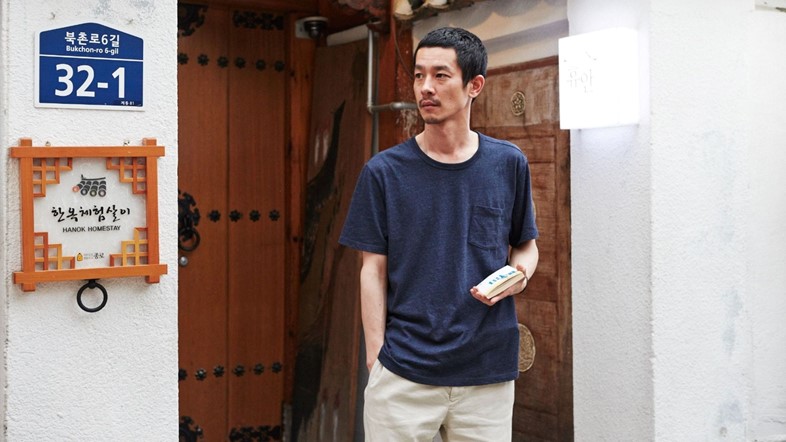
Hill of Freedom, 2014
Set entirely within Bukchon Hanok Village – a preserved neighbourhood of traditional houses in Seoul – Hill of Freedom tells the story of Mori (Ryo Kase, Silence), a young Japanese man who has come to Korea hoping to reunite with a former lover, Kwon. Amidst a series of encounters with locals, he finds himself attracting the attention of local café worker Yeongsan (Moon So-ri, Oasis).
Warm, light-hearted and funny, Hill of Freedom – which premiered at Venice in 2014 – crams charm and several great actors into its 66-minute run-time. But what makes it such a compelling piece of work is its innovative structure. The story is recounted through Mori’s letters to Kwon, which are dropped on the floor early on in the film. When the pages are collected, they are muddled into the wrong order – causing all kinds of temporal chaos for the film itself. Viewers are left to determine the order of scenes for themselves (clue: keep an eye on people’s clothes).
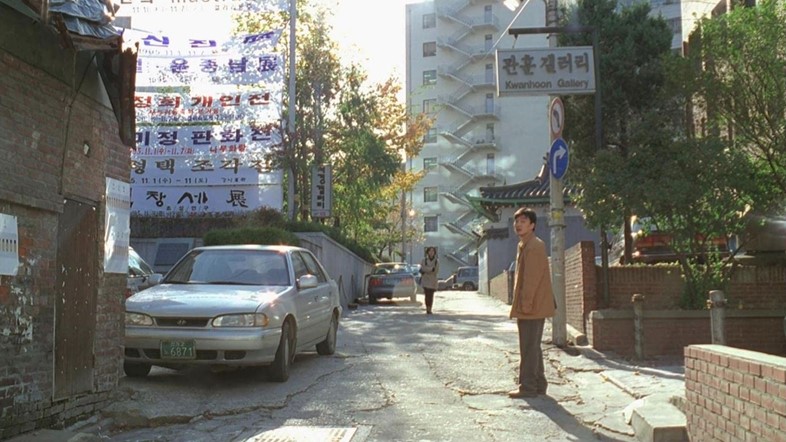
The Day a Pig Fell Into the Well, 1996
The Day a Pig Fell Into the Well – which follows four leads whose narratives were penned by four different writers – is a bit of an outlier in Hong’s canon due to its formal limitations and darker tone. Instead of trademark Hong mumblecore, this higher-budgeted debut film appears to take influence from the Taiwanese New Wave, particularly films like Edward Yang’s The Terrorizers or Tsai Ming-liang’s Rebels of the Neon God. This is made particularly evident through Hong’s compositional use of mirrors and window-frames.
While less remarkable than his later works, purists will appreciate it for its historical value. For one, it features the film debut of future Korean cinema superstar Song Kang-ho (Parasite; Sympathy for Mr Vengeance), who appears here in a classic 1990s get-up consisting of a big, double-breasted suit and a floppy mop-top.
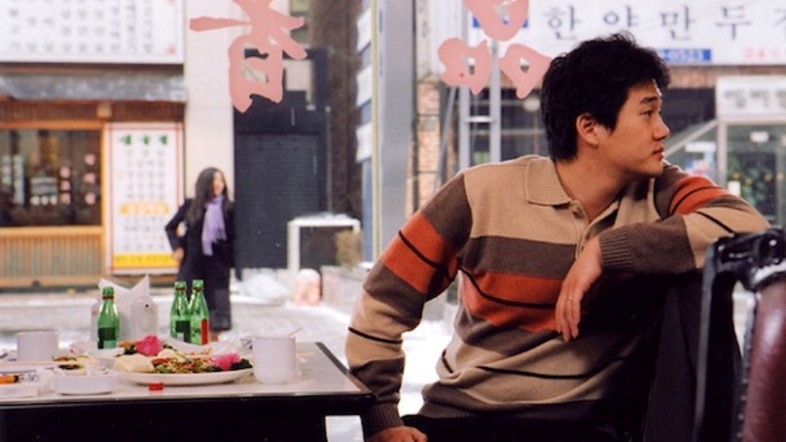
Woman Is the Future of Man, 2004
More exemplary of classic Hong style, though still bleaker and less humour-laden than his later works, was Hong’s first film to screen in competition at Cannes. Woman Is the Future of Man appeared in 2004 year alongside Park Chan-wook’s Oldboy – and funnily enough, both films share a main actor in Yoo Ji-tae (he plays the main villain in Park’s revenge thriller classic), though they are worlds apart in terms of form, production and themes.
Over a soju-saturated lunch as a winter snow falls, two boorish men discover that they both once dated the same woman – and decide to track her down. One man is a textbook alpha – a university art teacher (Yoo) who openly requests crude sexual favours from various women, while the other, a struggling filmmaker (Kim Tae-woo), struggles to control his emotions while under the influence of alcohol. Their rivalry in their pursuit of the same woman will ultimately only highlight their own insecurities.
This criticism of male archetypes is a typical theme of Hong’s films, though this film is more interesting for its role in shaping the director’s recognisable style. One extended lunchtime encounter at a local restaurant, captured side-on in long-take with a static camera, would become emblematic of his work – this scene will be repeated again and again in countless different guises throughout his filmography hereafter.
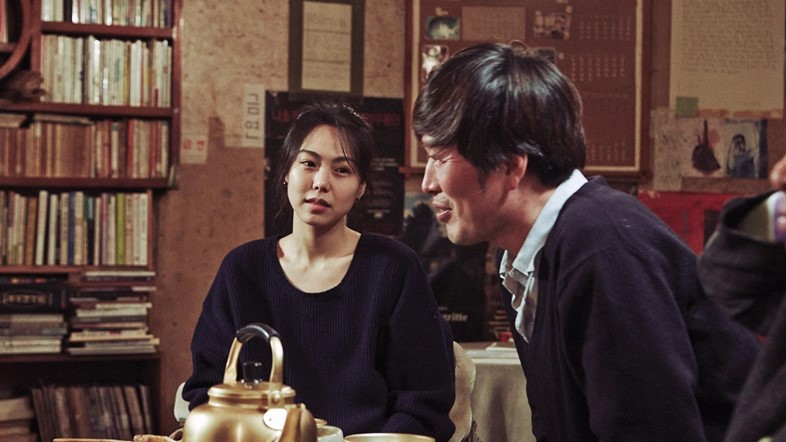
Right Now, Wrong Then, 2015
This Golden Leopard winner at the 2015 Locarno International Film Festival almost feels like Hong’s answer to Groundhog Day. Or, at least, a game of spot the difference. Part one (titled Right Then, Wrong Now) opens with a film director (Jung) arriving in the city of Suwon for a screening of one of his films. He wanders palace grounds and meets a beautiful woman (Kim Min-hee, The Handmaiden), a painter, who reluctantly agrees to join him for coffee, then sushi, then soju. Seemingly oblivious to her negative body language, the director ends up at a small party with the painter – where he embarrasses himself, terminating their would-be fling.
Part two (Right Now, Wrong Then) repeats the exact same sequence of events with minor differences, resulting in an entirely different conclusion. Is this the film director’s fantasy of how things would have turned out? Hong would offer an answer at a press conference for the film’s release. Asked what his grand vision was, the director responded by drawing two circles connected by two lines, writing underneath: “infinite worlds possible” – an idea quite easily applied to any one of his structurally experimental works.
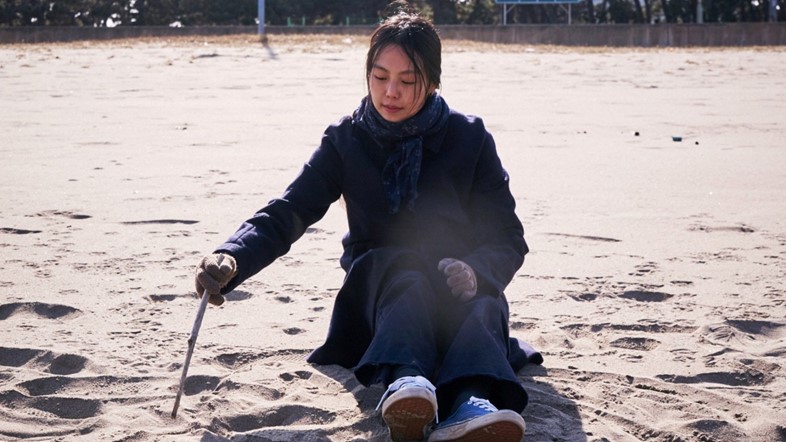
On the Beach at Night Alone, 2017
A once-famous actress named Young-hee (Kim Min-hee) mingles around Hamburg with a friend, ruminating on a relationship she’d had with a married film director. Later, she returns to Korea and learns that her ex-lover was torn apart by the repercussions of their affair. Between drunken outbursts and café conversations, Young-hee finds herself drawn to the open seafront – where she wonders what would unfold if she were to meet her former lover again.
A fine performance from Kim Min-hee aside (she won the Best Actress award at Berlin Film Festival), this film’s true power lies in its context. At the film’s premiere in 2017, director Hong confirmed the very public speculation that he had had an affair with Kim herself during the production of previous film, Right Now, Wrong Then – which resulted in the collapse of his first marriage.
With this knowledge, it becomes quite obvious that Young-hee and her fictional ex-lover are stand-ins for Kim and Hong themselves. The film thus becomes a kind of confession and explanation of their real-life affair, despite the narrative veering away from the true outcome of events (the pair are still together in real life). As far as Hong’s enigmatic meta-narratives go, this raw and vulnerable work really pushes the envelope – which only makes it more fascinating.
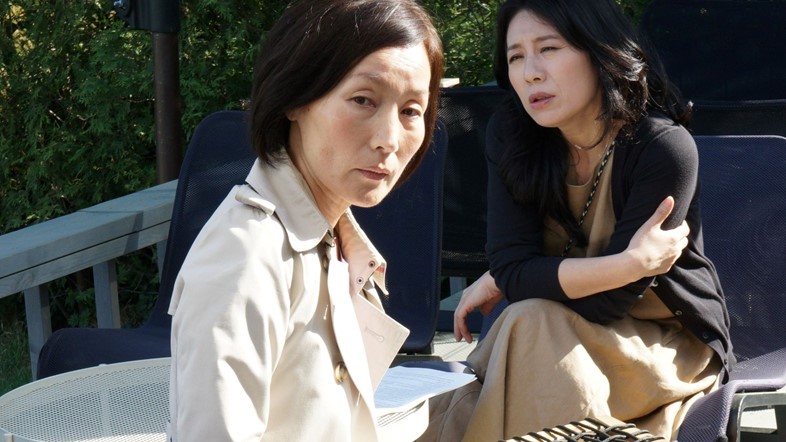
In Front of Your Face, 2021
After picking up the Best Director award at Berlin in 2020 for the quietly absorbing The Woman Who Ran, Hong debuted another minimalist gem centred upon female characters and their relationships at Cannes in 2021. Due for wide release in the UK this month, In Front of Your Face is a colourful and relatable work that crystallises many of Hong’s best tropes.
Sang-ok (Lee Hye-young), a former actress, has returned to Seoul and reunited with her sister (Jo Yoon-hee) after some time in the US looking after a liquor store. After a lakeside breakfast and some catching up, she heads off on a nostalgic bent – revisiting her childhood home (now a florist) before a meeting with a film director results in an unexpected revelation. All the while, she remains focused on the small joys – the ones that are, she says, “in front of my face”.
Allusions to dreams, faith and the afterlife hint at deeper readings, but In Front of Your Face is otherwise a straightforward and accessible film that turns the theme of ageing on its head. As always, Hong’s style and form is imperious, with naturalistic conversations captured in organic, free-flowing long takes (which go unbroken for as long as 20 minutes) – creating a transfixing atmosphere in which the actors’ exceptional craft is laid bare.
